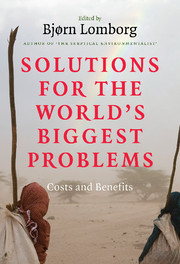Book contents
- Frontmatter
- Contents
- List of figures
- List of tables
- List of contributors
- Acknowledgements
- Introduction
- Part I Economy
- Part II Environment
- Part III Governance
- 11 Arms proliferation
- 12 Conflicts
- 13 Corruption
- 14 Lack of education
- 15 Terrorism
- Part IV Health and population
- Conclusion: Making your own prioritization
14 - Lack of education
Published online by Cambridge University Press: 08 July 2009
- Frontmatter
- Contents
- List of figures
- List of tables
- List of contributors
- Acknowledgements
- Introduction
- Part I Economy
- Part II Environment
- Part III Governance
- 11 Arms proliferation
- 12 Conflicts
- 13 Corruption
- 14 Lack of education
- 15 Terrorism
- Part IV Health and population
- Conclusion: Making your own prioritization
Summary
This chapter reviews the stylized facts regarding the distribution of human capital investments and the returns to those investments in developing countries. It then examines recent evidence regarding which policies can induce increased human capital investments in the most efficient manner, using estimated benefits and costs as a guide. Supply-side strategies such as increasing school access or improving school quality are more costly, have less certain benefits, and have a weak record of success. Demand-side interventions such as school sited health programs, vouchers, and conditional transfers have a greater likelihood of improving literacy in the most cost-effective manner.
Benefits
Few empirical relationships have been more frequently investigated than that between years of schooling and earnings. Literally hundreds of studies using alternative data sets from developing and developed countries, spanning many decades, and employing alternative specifications to correct for various potential sources of bias, have derived amazingly consistent estimated private returns per year of schooling. Average returns are almost universally positive and at or above market returns on other investments. Using harmonized household data sets from 48 developing countries, Fares, Montenegro and Orazem (2007) found that returns for women average 9.6% compared to 7.1% for men, and 8.1% for urban residents compared to 7.5% for rural residents. There may be external benefits from schooling beyond those that go to the individual. These social benefits include improved governance due to an educated electorate, improved climate for growth due to agglomerations of skilled individuals, reduced fertility behavior, and improved household health.
- Type
- Chapter
- Information
- Solutions for the World's Biggest ProblemsCosts and Benefits, pp. 241 - 262Publisher: Cambridge University PressPrint publication year: 2007



